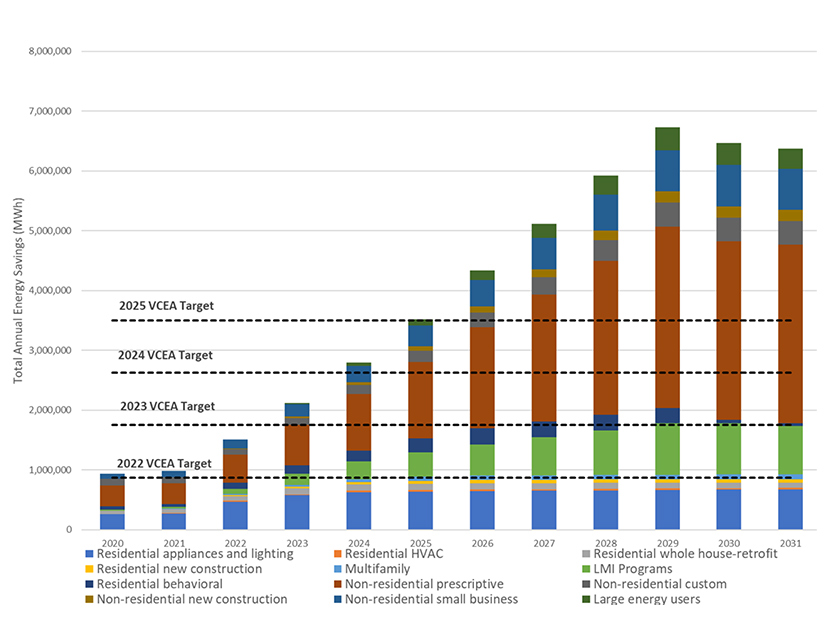Dominion Energy did not dispute a recent report prepared for a coalition of environmental groups that says the company will have to act quickly to ramp up its energy efficiency programs to comply with the Virginia Clean Economy Act (VCEA), but it did say the report’s comparisons to what is being achieved in other states need context.
“Comparisons to other states and utilities are extremely valuable data points. However, they must be unpacked and be accounted for in our commitment to deliver value-added programs for the commonwealth,” Dominion spokesperson Peggy Fox told NetZero Insider.
Prepared by the Vermont-based Energy Futures Group, Pathways for Energy Efficiency in Virginia says that Dominion can meet the VCEA’s 2022-2025 savings requirements by “implementing the kinds of energy efficiency programs that commonly provide the majority of energy savings for leading electric utilities.” But, the report says, “savings must be increased rapidly for the utility to achieve the savings requirement in 2023-2025.”
The report was commissioned by the National Housing Trust, the Nature Conservancy, the Virginia chapter of the Advanced Energy Economy and the American Council for an Energy Efficient Economy, which has the report posted on its website.
The VCEA, which Gov. Ralph Northam (D) signed into law in 2020, requires the state’s investor-owned utilities, including Dominion, to achieve set levels of energy efficiency savings starting next year. The utility will have to achieve total annual energy efficiency savings in 2022 equal to at least 1.25% of its 2019 annual jurisdictional retail electric sales, a rate that will increase by another 1.25% in each of the following three years.
Starting in 2026, the law says, the Virginia State Corporation Commission (SCC) is to set new energy efficiency savings targets. It also mandates that 15% of a utility’s energy efficiency expenses must be allocated to programs that benefit low-to-moderate-income (LMI) communities, the elderly, disabled and veterans.
While Dominion can meet the VCEA’s 1.25% saving target for 2022 with its existing, approved energy efficiency programs, the report finds it will not be able to achieve the law’s targets for 2023-2025, and looks at a range of scenarios under which those energy savings might be met. For example, a “high residential” scenario would emphasize programs that provide significant savings for families and households, such as HVAC programs, whole house retrofits and appliances and lighting. For “enhanced LMI,” energy efficiency kits might be distributed through food banks or other community organizations.
The other two scenarios in the report include one that focuses on efficiency programs for small business and a “balanced lower-cost” portfolio approach that combines cost-efficient residential programs with “high yield” commercial programs.
Comparing results of these scenarios with programs at 12 other large investor-owned utilities, the report finds:
- Dominion will need “significant increases in customer participation and a four-to-five-fold increase in incremental annual savings” to reach the 5% target in 2025.
- The utility is already falling behind on energy efficiency investments in LMI communities. The report notes, “In our analysis, the company has proposed approximately $355 million in total portfolio spending from 2020-2025, and just under $39 million, or 11%, for total LMI programs in the same period,” much less than the 15% that is mandated.
- Savings from programs geared toward meeting the 2022-2025 energy efficiency requirements “are likely to persist through the decade,” the report says. It calls on the SCC to set post-2025 targets well above 5%.
‘Piecemeal’ Programs
According to Fox, the utility currently has 27 active efficiency programs for residential, business and low-income customers, and 11 waiting for SCC approval.
But the utility was criticized for “slow-walking” its energy efficiency programs by advocacy groups speaking out at a public hearing before the SCC in June. At that time, Dominion had already admitted it would not meet the VCEA’s 2025 target. (See Dominion Criticized for ‘Slow Walking’ Demand Side Management.)
At the hearing, Nate Benforado, senior attorney with the Southern Environmental Law Center, said that “we still have serious concerns” that Dominion has not met its responsibilities. “The company has continued to proceed in a piecemeal fashion,” he said.
“We would like to see programs and budgets, and for the company to explain how they will meet these responsibilities,” Benforado said. The idea is not to push the company into developing a rigid plan, he added; instead, the plan should be flexible depending on future developments.
Also speaking at the hearing, Jim Grevatt, one of the co-authors of the Pathways study, said, “We’re really looking at probably the last opportunity the company has to change course to have a fair chance at meeting the requirements to comply with the savings targets established by the law.”
“The key here is that Dominion has many good options for meeting its energy savings targets under the law while helping all of its customers reduce their bills,” Mary Shoemaker, a senior research analyst at ACEEE and an adviser on the report, told NetZero Insider. ”They’d all be reasonable choices. The company can use tried-and-true energy efficiency programs developed in partnership with its stakeholder group to save costs for everyone from low-income households to industrial facilities and other businesses.”



